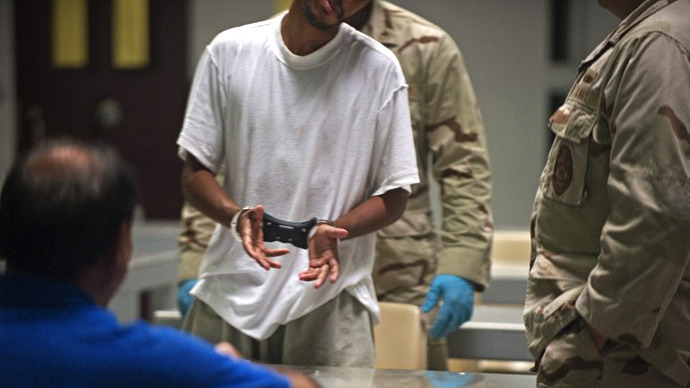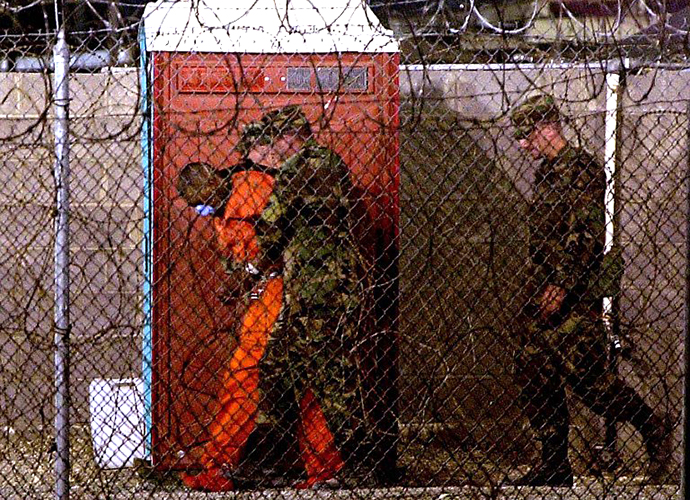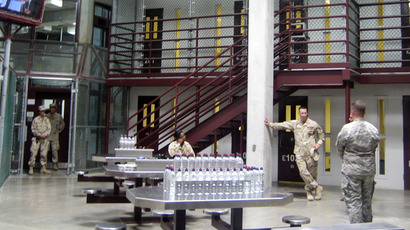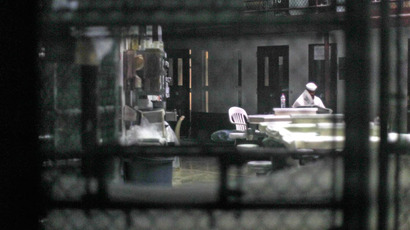'We need this hunger strike stopped before somebody dies' – Gitmo detainee’s attorney

Despite reassuring reports in the mainstream media, nothing has been done to resolve the hunger strike in Guantanamo, military attorney Barry Wingard told RT. A third party is needed to negotiate between the camp officials and the men suffering, he said.
Follow RT’s
day-by-day timeline on Gitmo hunger strike
“We need to get a neutral third person to negotiate between
the camp officials and the men who are hunger striking,”
Wingard said.
As many as 23 prisoners are now being forced to eat through nasal
tubes, as a mass hunger strike in Guantanamo nears the
unprecedented three-month benchmark. Lawyers for the detainees say
that as many as 130 of the 166 inmates are taking part, while the
US military insists it's ‘merely’ a hundred.
“I’m always amazed when I come to Guantanamo Bay, I read in the
mainstream media that there’s an effort to try to resolve the
hunger strike. When I’m here, I see no evidence of it in any way
performed. In fact, the prisoners report to me that nothing is
happening and no effort whatsoever is being made on behalf of the
men who are suffering which we found out is 23 and more than a
hundred hunger strikers,” Wingard said.
One of the prisoners earlier described the force-feeding procedure
as one of the most-painful he's ever experienced. Wingard told RT
his client is also among those in “a very bad condition.”
“He’s been force-fed for about two weeks. The force feeding is
more and more painful every time. The longer this goes on, the
worse he’s becoming. The situation is getting dire...”
Meanwhile, some 40 additional US Navy medical forces arrived in
Guantanamo over the weekend as the facility struggles to cope with
force-feedings and ailing prisoners.
“Nobody’s intention here is to die per se, but these men, you’ve
got to either charge them or you’ve got to release them. It’s been
11-and-a-half years - you’re not going to force them into
submission. They’ve been mistreated for many years. We need to get
some negotiations going and we need this hunger strike stop before
somebody dies,” the attorney added.

Earlier this week the UN human rights office has slammed
force-feeding the hunger strikers protesting their indefinite
incarceration without being presented charges.
"If it's perceived as torture or inhuman treatment -- and it's
the case, it's painful -- then it is prohibited by international
law," AFP has quoted spokesman for the UN high commissioner for
human rights, Rupert Coville, as saying.
“My client said it best to me today: ‘Hey, I’ve been here for
11-and-a-half years, I’m not charged with a crime, I’m never going
to get a trial, you wanna hold me forever. You won’t let me leave
in peace, you won’t let me die in peace, and the funniest thing of
all is, you blame ME for that! What kind of country do you come
from and how naïve are the people where you live?!’” Wingard
related.
On May 1, President Barack Obama said he is considering hiring a new State Department official to oversee options for a future transfer of the prison’s detainees once it closes.
“One of the options available to us that we're examining is reappointing a senior official at the State Department to renew our focus again on repatriating or transferring detainees that we determine can be returned to their home countries or third countries," White House spokesman Jay Carney was quoted as saying. He also admitted that the president’s hands are tied without congressional support.
“If the president’s and his administration’s goal is to go through Congress, then I’d summit to you that there’s many people in the American Congress that don’t care whether these men have committed a crime or not. Only five percent of the men have any charges against them. That’s 5 per cent of the 166. So no, I don’t think you are going to find anything in Congress that’s going to be satisfactory if that’s the route you choose to take. We need leadership from Washington and that’s the answer,” Wingard explained.
It has been revealed earlier this week that a US lawyer, Andy P.
Hart, representing detainees at the Guantanamo Bay prison camp, was
found dead in an apparent suicide. According to court documents,
38-year-old Hart had previously represented Kahlid Saad Mohammed, a
39-year-old Guantanamo detainee from Saudi Arabia who was
transferred back to his home country in 2009 after being identified
as having only ‘low-level’ terrorist affiliation. He was also
assigned to defend Mohammed Rahim al-Afghani, one of 16 detainees
at Guantanamo which the US government labeled as ‘high-value’.
Al-Afghani, thought to be Osama Bin Laden’s translator, was
detained by the CIA and allegedly tortured prior to his arrival in
Cuba in 2008.
The Guantanamo Bay facility was set up by former president George
W. Bush to hold those allegedly responsible for the September 11,
2001, terrorist attacks. However, the detainees accused of
terrorism still remain in prison without trial. Only nine have been
formally charged or convicted of a criminal offense.














